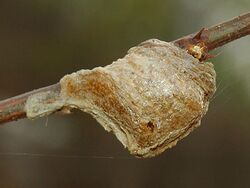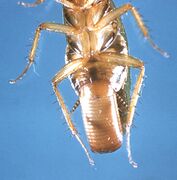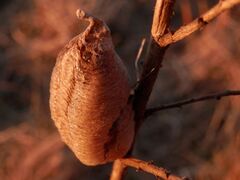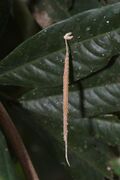Biology:Ootheca

An ootheca /oʊ.əˈθiːkə/ (pl.: oothecae /oʊ.əˈθiːsiː/) is a type of egg capsule made by any member of a variety of species including mollusks (such as Turbinella laevigata), mantises, and cockroaches.[1][2][3]
Etymology
The word is a Latinized combination of oo-, meaning "egg", from the Greek word ōon (cf. Latin ovum), and theca, meaning a "cover" or "container", from the Greek theke. Ootheke is Greek for ovary.
Structure
Oothecae are made up of structural proteins and tanning agents that cause the protein to harden around the eggs, providing protection and stability.[1] The production of ootheca convergently evolved across numerous insect species due to a selection for protection from parasites and other forms of predation, as the complex structure of the shell casing provides an evolutionary reproductive advantage (although the fitness and lifespan also depend on other factors such as the temperature of the incubating ootheca). [4][5] Oothecae are most notably found in the orders Blattodea (Cockroaches) and Mantodea (Praying mantids), as well as in the subfamilies Cassidinae (Coleoptera) and Korinninae (Phasmatodea).[6]
Functions
The ootheca protects the eggs from microorganisms, parasitoids, predators, and weather; the ootheca maintains a stable water balance through variation in its surface, as it is porous in dry climates to protect against desiccation, and smooth in wet climates to protect against oversaturation. Its composition and appearance vary depending on species and environment.[7][8][3]
Image gallery
-
Female cockroach (Periplaneta americana) with ootheca
-
Female cockroach (Blatella germanica) with ootheca
-
Chinese mantis ootheca
-
Sagittal section of mantis ootheca (Hierodula patellifera) already hatched out
-
Praying mantis (Mantis religiosa) ootheca in Ontario, Canada.
-
Damaged praying mantis (Mantis religiosa) ootheca in Ontario, Canada.
-
Praying mantis ootheca in Kerala, India
-
Ootheca of a blattodea
-
Blaptica dubia – ootheca in an artificial colony
See also
- Sang piao xiao, mantis oothecae used in traditional Chinese medicine
- Egg cases, also known as egg capsules
References
- ↑ 1.0 1.1 Brunet, P. C. J. (1 June 1951). "The Formation of the Ootheca by Periplaneta americana : I. The Micro-anatomy and Histology of the posterior part of the Abdomen". Journal of Cell Science s3-92 (18): 113–127. doi:10.1242/jcs.s3-92.18.113. http://jcs.biologists.org/content/s3-92/18/113.
- ↑ Grimaldi, David; Engel, Michael S. (2005-05-16) (in en). Evolution of the Insects. Cambridge University Press. pp. 230. ISBN 9780521821490. https://books.google.com/books?id=Ql6Jl6wKb88C&q=oothecae&pg=PA230.
- ↑ 3.0 3.1 Matthews-Cascon, Helena; Rocha-Barreira, Cristina de Almeida; Meirelles, Carlos; Bigatti, Gregorio; Penchaszadeh, Pablo (April 2009). "Description of the ootheca of Turbinella laevigata (Mollusca, Gastropoda)". Brazilian Archives of Biology and Technology 52 (2): 359–364. doi:10.1590/S1516-89132009000200013.
- ↑ Goldberg, Julia; Bresseel, Joachim; Constant, Jerome; Kneubühler, Bruno; Leubner, Fanny; Michalik, Peter; Bradler, Sven (16 January 2015). "Extreme convergence in egg-laying strategy across insect orders". Scientific Reports 5 (1): 7825. doi:10.1038/srep07825. PMID 25592976. Bibcode: 2015NatSR...5E7825G.
- ↑ Tee, Hui-Siang; Lee, Chow-Yang (27 December 2016). "Influences of Temperature and Ootheca Age on the Life History of the Cockroach Ootheca Parasitoid Aprostocetus hagenowii (Hymenoptera: Eulophidae)". Journal of Economic Entomology 110 (1): 213–220. doi:10.1093/jee/tow287. PMID 28028170.
- ↑ "Ootheca - Entomologists' glossary - Amateur Entomologists' Society (AES)". https://www.amentsoc.org/insects/glossary/terms/ootheca.
- ↑ Insekten : [Autoren dieses Bd.: Kurt Günther ...].. Günther, Kurt., Petzsch, Hans., Deckert, Kurt., Mauersberger, Gottfried., Crome, Wolfgang. ([Neuausg.], 1. Aufl ed.). Leipzig [u.a.]: Urania-Verl. 1994. ISBN 3332004980. OCLC 61813597.
- ↑ Keller, Laurent (March 1998). "The Evolution of Social Behavior in Insects and Arachnids. Jae C. Choe , Bernard J. Crespi". The Quarterly Review of Biology 73 (1): 110–111. doi:10.1086/420149.
External links
 |









